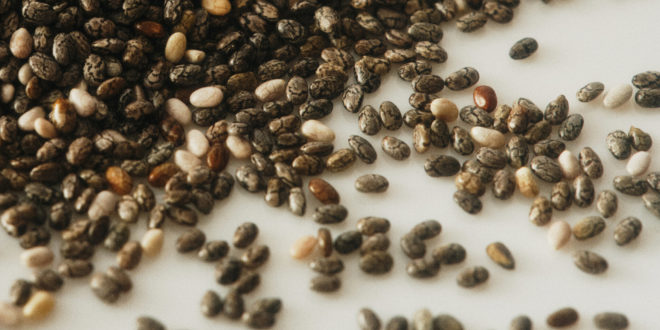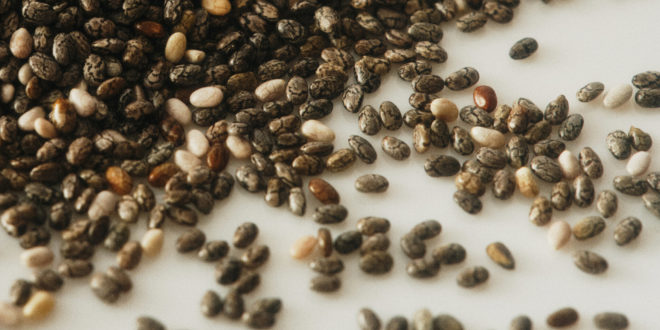
Check Out The Seed That Can Help You Live A Longer Life3 min read


Chia seeds contain quercetin, an antioxidant that can reduce your risk of developing several health conditions, including heart disease.
The seeds are also high in fibre, which can help to lower high blood pressure and, in turn, reduce your risk of developing heart disease.
In fact, just two tablespoons of chia seeds has two times more antioxidants than blueberries, provides 20 percent of your protein, has three times more iron than spinach and has 64 percent more potassium than bananas making it a staple for those wanting to boost their longevity in an easy way.
Chia seeds contain several components that, when eaten as part of a balanced plant-rich diet, may prevent the development of various chronic diseases, said the School of Public Health.
The site added: “Of particular interest by researchers is chia seeds’ high content of alpha-linolenic (ALA) fatty acids. Sixty percent of the oil in chia seeds is from these omega-3 fatty acids.
“In animal and human studies, omega-3 fatty acids have shown a beneficial effect on cardiovascular health (lowering cholesterol, regulating heart rhythms and blood pressure, preventing blood clots, decreasing inflammation).”
Weight loss
Despite their tiny size, chia seeds are highly nutritious. They’re packed with fibre, protein, omega-3 fatty acids, and various micronutrients.
The fibre and protein in chia seeds may benefit those trying to lose weight.
Most of the fibre in chia seeds is soluble fibre which absorbs water, becomes gel-like, and expands in the stomach
This action helps to slow your digestion and help you feel full after a meal.
On the whole chia seeds are well-tolerated, however, consuming too many in one sitting may cause abdominal discomfort, constipation and bloating.
For this reason, it is important to drink adequate amounts of water, especially if the seeds have not been pre-soaked.
Those with inflammatory bowel disease such as ulcerative colitis, Crohn’s disease or diverticulitis may need to regulate their fibre intake and limit their consumption of high fibre foods such as chia seeds.



















Kamagra pharmacie en ligne: Kamagra Oral Jelly pas cher – Achetez vos kamagra medicaments
Cialis sans ordonnance 24h: Cialis sans ordonnance 24h – Acheter Viagra Cialis sans ordonnance tadalmed.shop
kamagra en ligne: achat kamagra – kamagra en ligne
https://pharmafst.shop/# pharmacie en ligne france livraison belgique
Cialis sans ordonnance 24h: cialis generique – Acheter Cialis tadalmed.shop
Tadalafil achat en ligne [url=https://tadalmed.com/#]Tadalafil 20 mg prix en pharmacie[/url] Pharmacie en ligne Cialis sans ordonnance tadalmed.com
Acheter Cialis 20 mg pas cher: Cialis sans ordonnance 24h – Cialis sans ordonnance 24h tadalmed.shop
Tadalafil 20 mg prix sans ordonnance: Tadalafil 20 mg prix sans ordonnance – Acheter Cialis 20 mg pas cher tadalmed.shop
kamagra gel [url=https://kamagraprix.shop/#]Achetez vos kamagra medicaments[/url] Kamagra Oral Jelly pas cher
http://kamagraprix.com/# kamagra oral jelly
pharmacie en ligne france fiable: pharmacie en ligne france livraison belgique – Pharmacie en ligne livraison Europe pharmafst.com
kamagra oral jelly: Kamagra Commander maintenant – Kamagra pharmacie en ligne
acheter kamagra site fiable [url=https://kamagraprix.shop/#]kamagra pas cher[/url] kamagra 100mg prix
kamagra livraison 24h: Kamagra Oral Jelly pas cher – Kamagra Commander maintenant
http://pharmafst.com/# Pharmacie sans ordonnance
kamagra pas cher [url=https://kamagraprix.com/#]Acheter Kamagra site fiable[/url] kamagra 100mg prix
Pharmacie en ligne Cialis sans ordonnance: Tadalafil achat en ligne – Cialis sans ordonnance 24h tadalmed.shop
Achat Cialis en ligne fiable: Tadalafil 20 mg prix en pharmacie – cialis sans ordonnance tadalmed.shop
kamagra en ligne: kamagra oral jelly – Kamagra pharmacie en ligne
http://kamagraprix.com/# achat kamagra
Acheter Cialis 20 mg pas cher: Pharmacie en ligne Cialis sans ordonnance – Pharmacie en ligne Cialis sans ordonnance tadalmed.shop
Kamagra pharmacie en ligne [url=https://kamagraprix.com/#]kamagra gel[/url] acheter kamagra site fiable
kamagra gel: kamagra en ligne – achat kamagra
https://pharmafst.shop/# Pharmacie en ligne livraison Europe
Cialis en ligne: cialis generique – Cialis generique prix tadalmed.shop
kamagra oral jelly [url=https://kamagraprix.com/#]Kamagra Oral Jelly pas cher[/url] kamagra 100mg prix
Cialis en ligne: Tadalafil 20 mg prix sans ordonnance – Cialis sans ordonnance 24h tadalmed.shop
http://pharmafst.com/# Pharmacie sans ordonnance
п»їpharmacie en ligne france: pharmacie en ligne sans ordonnance – vente de mГ©dicament en ligne pharmafst.com
п»їpharmacie en ligne france: pharmacie en ligne – pharmacie en ligne pharmafst.com
п»їpharmacie en ligne france: Pharmacie en ligne livraison Europe – Achat mГ©dicament en ligne fiable pharmafst.com
https://tadalmed.shop/# cialis prix
kamagra livraison 24h: kamagra oral jelly – Acheter Kamagra site fiable
https://pharmafst.shop/# pharmacie en ligne france livraison belgique
kamagra oral jelly: kamagra gel – achat kamagra
http://kamagraprix.com/# Kamagra pharmacie en ligne
kamagra pas cher: Acheter Kamagra site fiable – kamagra en ligne
https://pharmafst.com/# pharmacie en ligne sans ordonnance
Acheter Cialis: Acheter Cialis 20 mg pas cher – Cialis en ligne tadalmed.shop
achat kamagra [url=https://kamagraprix.shop/#]Acheter Kamagra site fiable[/url] kamagra 100mg prix
https://tadalmed.shop/# Cialis sans ordonnance pas cher
Kamagra pharmacie en ligne: Kamagra pharmacie en ligne – kamagra pas cher
Pharmacie sans ordonnance [url=http://pharmafst.com/#]Medicaments en ligne livres en 24h[/url] pharmacie en ligne pas cher pharmafst.shop
https://tadalmed.com/# Tadalafil 20 mg prix en pharmacie
Rx Express Mexico: Rx Express Mexico – mexico pharmacy order online
https://medicinefromindia.com/# Medicine From India
best rated canadian pharmacy [url=https://expressrxcanada.com/#]best canadian pharmacy online[/url] canadian pharmacy 24h com
cheap canadian pharmacy online: Canadian pharmacy shipping to USA – canadadrugpharmacy com
canadian pharmacy online: Generic drugs from Canada – canada pharmacy world
http://rxexpressmexico.com/# mexican rx online
onlinecanadianpharmacy [url=https://expressrxcanada.com/#]Express Rx Canada[/url] best mail order pharmacy canada
mexican online pharmacies prescription drugs: mexican drugstore online – mexico pharmacies prescription drugs
mexico pharmacies prescription drugs: mexican online pharmacy – Rx Express Mexico
http://rxexpressmexico.com/# mexico pharmacy order online
Rx Express Mexico: mexican online pharmacy – mexico drug stores pharmacies
my canadian pharmacy reviews: reliable canadian pharmacy – safe online pharmacies in canada
https://rxexpressmexico.com/# Rx Express Mexico
legitimate canadian pharmacy: Generic drugs from Canada – canadian world pharmacy
Medicine From India: Medicine From India – MedicineFromIndia
http://medicinefromindia.com/# MedicineFromIndia
indian pharmacy online shopping: indian pharmacy – Medicine From India
india pharmacy mail order [url=http://medicinefromindia.com/#]indian pharmacy paypal[/url] indian pharmacy
http://rxexpressmexico.com/# Rx Express Mexico
canadian online pharmacy: real canadian pharmacy – precription drugs from canada
adderall canadian pharmacy: Express Rx Canada – canadianpharmacymeds com
https://medicinefromindia.com/# indian pharmacy online
Medicine From India [url=https://medicinefromindia.com/#]Online medicine order[/url] indian pharmacy
canadian valley pharmacy: the canadian drugstore – canadian discount pharmacy
Rx Express Mexico: Rx Express Mexico – mexico pharmacies prescription drugs
http://medicinefromindia.com/# indian pharmacy online
mexican online pharmacy [url=https://rxexpressmexico.com/#]mexican rx online[/url] Rx Express Mexico
best canadian online pharmacy: ExpressRxCanada – pharmacies in canada that ship to the us
Rx Express Mexico: buying from online mexican pharmacy – mexican rx online
https://expressrxcanada.shop/# canadian online pharmacy reviews
пин ап казино официальный сайт [url=https://pinuprus.pro/#]пин ап вход[/url] пин ап зеркало
pin up вход: пин ап вход – пин ап казино
https://pinuprus.pro/# пин ап вход
vavada вход [url=http://vavadavhod.tech/#]вавада казино[/url] вавада
пин ап казино: pin up вход – пин ап казино официальный сайт
https://vavadavhod.tech/# вавада зеркало
pinup az [url=http://pinupaz.top/#]pin up casino[/url] pin up